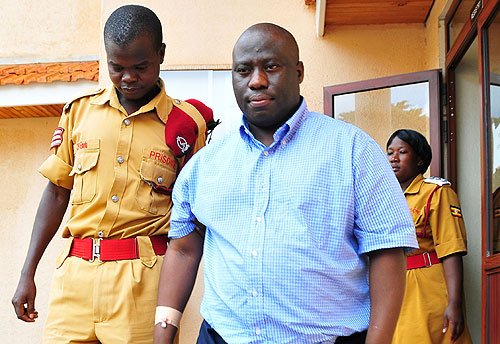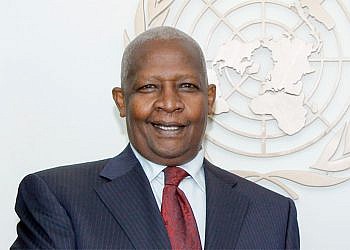Jailed former principal accountant in the Office of the Prime Minister, Geoffrey Kazinda has dragged the Ugandan government to the East African Court of Justice (EACJ) regarding his cases.
Kazinda, who is currently at Luzira Prison is challenging several prosecutions and convictions of the Anti Corruption Court and the Court of Appeal regarding fraud related charges.
While representing himself, Kazinda is seeking for declarations that the actions, proceedings and decisions of the Court of Appeal delivered in 2020 are unlawful, infringed on the fundamental and operational principles of the East African community which include good governance, adherence to the principles of democracy, rule of law and accountability.
In the case against the Attorney General of Uganda, Kazinda is also asking the EACJ to issue an order canceling the decisions of the Court of Appeal in Uganda as well as the Anti- Corruption Court in which it arose.
In related development, the regional court has dismissed an application by the IGG to be party to the case.
Court documents show that the IGG investigated and prosecuted cases of illicit enrichment in which Kazinda was convicted before the Anti- Corruption Court leading to orders directing the confiscation of his property.
However, the regional court dismissed with costs, the application by the IGG reasoning that the Ugandan government ombudsman is not an institution of the (East African) community as envisaged under Article 30 (1) nor is she an organ of the community as stipulated under Article 9(1) of the treaty.
A panel of judges of the EACJ led by Principal Judge Yohane B. Masara ruled that the IGG has no international legal personality and hence cannot be held responsible for the government of Uganda’s acts or omissions under the Treaty.
“The actions of the applicant (IGG) can therefore only be challenged in this court through the Attorney General as the applicant does not personally fall within the purview of the treaty. She cannot be joined as a respondent to any proceedings before this court and the court has no jurisdiction over her in that context,” the court ruled.
Judge Masara held, “Having determined that the IGG has no locus standi to appear in the capacity that she seeks to do in this court, and that the court has no jurisdiction over them in that regard, the court cannot proceed beyond this point.”
The November 23, 2023 ruling of the regional court has now forced the IGG to withdraw an appeal that had sought to challenge Kazinda’s case.
“The Inspectorate of government hereby withdraws the notice of Appeal and its intention to proceed with any further appeal processes in the matter with immediate effect,” reads the notice.
In March 2022, the Court of Appeal dismissed Kazinda’s appeal challenging his conviction and sentence which prompted the jailed accountant to petition the regional court seeking to overturn the proceedings and decisions of the appellate court.
Earlier in 2020 , the Constitutional Court directed that the Anti Corruption Court discharges Kazinda in all cases and any future cases whose offenses are founded on facts regarding his tenure as principal accountant at OPM.
The court also prohibited the state from using any process of court so as to initiate and prosecute Kazinda for any offences similar in character or founded on the same facts whatsoever arising out of or in connection with his former employment as principal accountant in the OPM.
“…that the successive trials against the petitioner (Kazinda) deny him a right to a speedy trial and consequently, he cannot have adequate time to prepare his defence. This has caused irreparable prejudice to the petitioner in that he was not accorded a hearing at his place of work nor was he heard by either the Auditor General or the public accounts committee,” the court ruled.
The court added that Kazinda faced an average of one completed case per year or three recurrent trials per year.
“Under these circumstances, the petitioner has been exposed to inadequate time to effectively prepare for his defence owing to the fact that two or more matters are litigated at the same time. From October 2018, the petitioner has been required to prepare defense witnesses for the third and sixth trials as well as prepare for the sevenths trial,” held the judges adding that Kazinda lacked time to prepare for various trials and that he was denied a right a speedy trial due to lengthy trials of some which have been withdrawn along the way.
However, despite the 2020 Constitutional Court decision and orders, the Anti Corruption Court continued with the trial in which Kazinda was convicted and sentenced to 25 years imprisonment.
The case awaits hearing and determination before the appeal court.








































